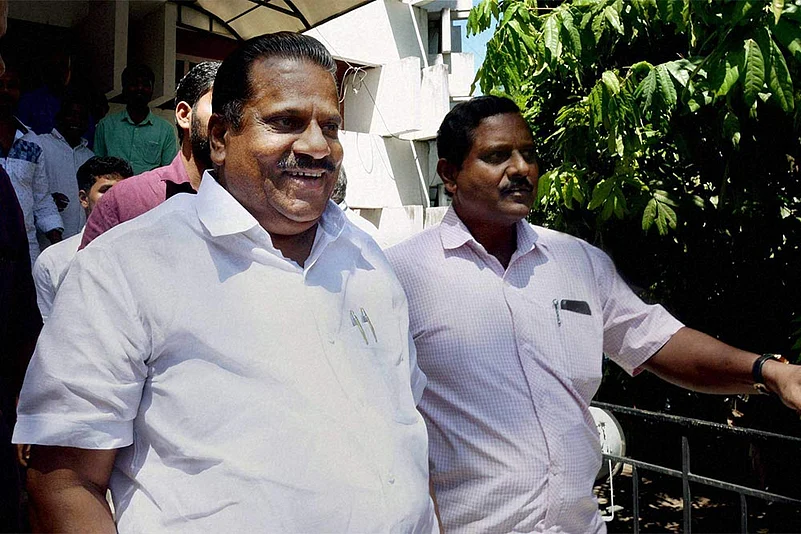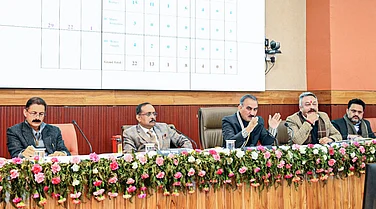- The Resignation: After an uproar in media, CPI(M) minister E.P. Jayarajan, accused of nepotism, resigned.
- The Reason: Appointed his wife’s nephew as the MD of a Kerala PSU. He is said to have resigned to save the party’s image.
- The Anticipation: It remains to be seen whether Jayarajan will face any disciplinary action from the party’s central committee.
***
Kannur, a district in north Kerala, has earned notoriety for its killing fields. For decades, RSS and Marxist cadres in the region have bumped each other off with such regularity that reports of the deaths do not raise eyebrows anymore. The district is now spectacularly in the news for another reason, which makes it touch rock bottom on the morality front. Kerala’s industries and sports minister E.P. Jayarajan from Kannur, a prominent face of what is known in political circles as the Communist Party of India (M)’s Kannur lobby, quit from the fledgling Left government on charges of nepotism and corruption. Incidentally, the chief minister Pinarayi Vijayan and the CPI(M) state party chief Kodiyeri Balakrishnan are also from the district. Besides that, the Kerala cabinet has now three ministers from Kannur (with Jayarajan it was four) and the CPI(M)’s decision-making body, the central committee, is also filled with apparatchik from Kannur. Perhaps the violent political arena of Kannur has thrown up more rough-and-tough leaders than the rest of the state.
In the wake of the nepotism charges against Jayarajan, CM Vijayan was quick to claim the moral high ground after accepting the resignation of his loyalist and close buddy. Jayarajan, who is known for his proximity to Vijayan, was seen as one of the most powerful ministers in the cabinet, second only to the chief minister. Embarrassing the Left government, Jayarajan had flouted the law even before he had warmed his seat by filling plum posts in the state public sector units with his relatives: His wife’s nephew, P.K. Sudheer (also son of CPI(M) Lok Sabha MP P.K. Sreemathi), was appointed as the MD of the Kerala State Industrial Enterprises Limited and his brother’s daughter-in-law, Deepthi Nishad, held the post of the GM of Clay and Ceramics Products Limited. Both of them were not qualified for their respective posts and had to quit after a media/social media outcry.
State secretary Kodiyeri Balakrishnan told the media following the resignation that Jayarajan had admitted he had made a mistake and had resigned to save the image of the party. He wanted to show that the CPI(M) was different from the others. “We are different from the UDF and the BJP.” He added that though there were vigilance cases against eight ministers in the former UDF government, they did not resign till the court pressured K.M. Mani to do so. The vigilance and anti-corruption bureau has also ordered a preliminary inquiry into the charges the minister is facing.
Though the political damage was contained to some extent, the question on everyone’s lips is: how did Jayarajan, who is not an ideologue or a mass leader, come to occupy positions of power both in CPI(M)’s decision-making body (the central committee), and in the government? The proximity Jayarajan enjoyed with Vijayan ensured he escaped the party’s disciplinary action time after time. But in this instance, the corruption scandal would have festered, dragging the CM with it if he had not very wisely let go. Known for courting controversy, even when Vijayan was state party secretary, Jayarajan proved he had not shed his old ways as minister. He behaved like he was still in the backyards of Kannur. Perhaps he would have continued as minister if a party branch committee in Kannur had not militated against P.K. Sudheer’s appointment. They sent a complaint to the area committee and that complaint went up the party’s hierarchical structure. And the complaint would have been consigned to the dustbin in an Orwellian fashion if it had not been for mainstream media and social media intervention. The CPI—a left ally in the government—in its Janyugom editorial vehemently wrote that Jayarajan’s actions would damage the image of the Left parties. The Left front had after all come to power raising the issue of corruption in the past UDF government.

“The lifestyle of Jayarajan is totally against communist values,” says I.V. Babu, a former member of the CPI(M), who fought the assembly elections as an independent candidate against Vijayan in Dharmadam, Kannur. “Communist leaders are expected to lead simple lives eating simple food, but Jayarajan had publicly dismissed this by saying he cannot live the rest of his life on ‘black tea and parrippu vada’, considered the staple of a communist.” Babu seems to think that leaders from Kannur do not make ‘ideal’ Marxists. “In fact, the lifestyle of leaders from Kannur is quite at variance from that of other Communist leaders. They seem to be more self-centred. It is quite evident that Jayarajan has failed to internalise the Marxist morals and ethics. If it had been anyone else, the party would have long expelled them for lesser reasons,” he adds.
RMP (Revolutionary Marxist Party) leader K.S. Hariharan agrees with Babu. “During one football match organised in the name of former chief minister E.K. Nayanar, Kingfisher beer was sponsoring the event. The posters urged people to buy a beer and enjoy the match. It shocked everyone further when Jayarajan arrived in Vijay Mallya’s luxurious car for the match. No one does it so blatantly. He has been courting industrialists and collecting money in the name of the party from them,” he alleges.
The larger picture points to the decay of the values and traditions of the communist party as some of the ministers are seen to embrace capitalism’s “bourgeois” ways. The party’s state website gives clear guidelines for those who can donate: “CPI(M) will not accept donations from corporate entities. CPI(M) Kerala will accept donations from individuals with absolutely clean records.” But Jayarajan was accused of such policies. He was in the eye of the storm in 2007 when as general manager of CPM mouth piece Deshabhimani he accepted Rs 2 crore from the lottery kingpin Santiago Martin, who ran a 7,000 crore lottery business and was being investigated for tax evasion by the then Left government with V.S. Achuthanandan at its helm. Jayarajan was briefly suspended for not showing “due diligence” while accepting the money, but was brought back to the post in 2008 by the state secretariat headed by Vijayan. Jayarajan had unwaveringly supported Vijayan when the party was clearly divided into factions: the Pinarayi faction and the Achuthanandan faction. In another instance in 2013, Jayarajan sold 32.5 cents of property owned by Deshabhimani to the Coimbatore-based Capital City Hotels & Developers Private Limited owned by V.M. Radhakrishnan, who is an accused in a murder case, for a nominal amount. Jayarajan defended the deal saying that the property was sold to Danish Chacko, who was later found to be the MD of the company only for a few weeks, while Radhakrishnan assumed charge of the company soon after the deal. An advertisement by Radhakrishnan in Deshabhimani created another uproar.
In his short stint as minister, Jayarajan was more in the news for controversies than anything else. He was the internet troll’s delight when he goofed up big time calling legendary boxer Muhammad Ali a revered Kerala sportsman, who had won gold medals for the state. The opposition seemed to think he was bumbling around. Shortly after the Ali episode, Anju Bobby George, a renowned athlete from the state, quit as head of the Kerala Sports Council when Jayarajan disagreed with her in a very public altercation.
Jayarajan may have done some damage control by handing in his resignation, but the party’s central committee will have some questions for him. Now, it is to be seen whether the party apparatus will take any disciplinary action against Jayarajan and also P.K. Sreemathi for nepotism.


























